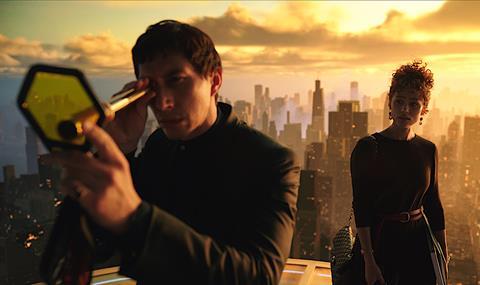Francis Ford Coppola’s grand vision of a new world order fails to live up to its ambition

Dir/scr: Francis Ford Coppola. US 2024. 139mins
An anguished cry for the fall of American democracy, the operatic Megalopolis similarly collapses under its own weight. Writer/director Francis Ford Coppola’s first film in 13 years is a swaggering portrait of a New York-like metropolis in which two competing visions for the city’s future rock the very foundations of society— and also serve as the backdrop to a star-crossed romance. Adam Driver brings a brooding energy to the role of a tortured genius architect seeking to craft a modern utopia in a city threatened by mindless spectacle and rampant greed, but Megalopolis is stymied by arbitrary plotting and numbing excess. One can feel Coppola’s anger and sorrow over the decline of his beloved America, but narrative coherence is far less apparent.
Numbing excess
The two-time Palme d’Or-winning director returns to Cannes in a competition spot, with this decades-in-the-work opus. Much is riding on Megalopolis — and not just the reported $120 million Coppola invested in this self-funded opus. At a time when Hollywood studios seem allergic to risk-taking cinema, this artistic big swing feels like a welcome throwback to an earlier era when mavericks such as Coppola delivered audacious works. Yet commercial prospects do not look promising.
Set in the near-future city of New Rome, the picture stars Driver as Cesar, who proposes rebuilding this metropolis into a more utopian society. Cynical Mayor Cicero (Giancarlo Esposito) prefers to erect lavish casinos and other decadent landmarks. The longtime fued between the two men escalates after Cicero’s inquisitive daughter Julia (Nathalie Emmanuel) takes a liking to Cesar, intrigued by his idealism but also curious about what happened to his late wife. (When her father was New Rome’s district attorney, he unsuccessfully prosecuted Cesar for murder.) Meanwhile, Cesar’s scheming cousin Clodio (Shia LaBeouf) plots to lead a rebellion of the lower class to take over New Rome.
Coppola has been developing this material since the late 1970s, drawing inspiration from the failed overthrow of the Roman Republic in 63 BC. Laurence Fishburne’s booming voice-over leaves no doubt that Coppola views the US as a modern Roman Empire waiting to be levelled because of its hedonism and spiritual soullessness. Cinematographer Mihai Malaimare Jr and production designers Bradley Rubin and Beth Mickle have conceived a gaudy, fading New York that combines Roman accents with a slightly sci-fi futurism.
Unfortunately, in trying to dramatise this amoral society, Coppola wildly miscalculates his tone, resulting in a series of cartoonish performances. Driver mostly acquits himself as a dreamer with dark secrets who finds himself infatuated with Julia, despite how much he loathes her father. But too many of his co-stars have been encouraged to amplify their one-note characters, which only makes the performances louder, not more arresting.
Aubrey Plaza exudes a slinky cunning as financial journalist Wow Platinum, but she can only do so much to elevate this cliched evil seductress. Clodio, who embodies the flair of real-life right-wing politicians for whipping up crude populist attitudes, is played by LaBeouf so broadly that the portrayal quickly devolves into campy shtick. Indeed, Coppola populates New Rome with symbols, not people, which forces the actors to embody simplistic notions of liberty, materialism, anarchy, idealism and art.
Fans of this ambitious director will see in Megalopolis echoes of his past marvels. New Rome’s hallucinatory destroyed paradise will conjure memories of Apocalypse Now, while the lament for a bankrupt culture that demeans true innovation recalls Coppola’s underrated Tucker: The Man And His Dream. And the film’s advocacy for true love as civilisation’s one beacon of hope is especially poignant in the wake of the April passing of Coppola’s wife and collaborator Eleanor, to whom Megalopolis is dedicated. (Tellingly, Cesar and Julia’s romance, though underdeveloped, is the picture’s sharpest element.)
But the amount of stray ideas and themes that are introduced, then abandoned — such as the fact that Cesar has the ability to stop time — leave Megalopolis feeling like an unwieldy mess. Cesar and Cicero’s showdown over New Rome is handled in terribly disjointed ways, and the attempts by supporting characters to grasp power add to the picture’s cluttered construction. In recent years, few auteurs have dreamed as boldly as Coppola has with this film, but some visions, as Megalopolis’ characters discover, are doomed to failure.
Production company: American Zoetrope
International sales: Goodfellas, Flavien Eripret feripret@goodfellas.film
Producers: Francis Ford Coppola, Fred Roos, Barry Hirsch, Michael Bederman
Cinematography: Mihai Malaimare Jr.
Production design: Bradley Rubin, Beth Mickle
Editing: Cam McLauchlin, Glen Scantlebury
Music: Osvaldo Golijov
Main cast: Adam Driver, Giancarlo Esposito, Nathalie Emmanuel, Aubrey Plaza, Shia LaBeouf, Jon Voight, Laurence Fishburne, Talia Shire, Jason Schwartzman, Kathryn Hunter, Grace VanderWaal, Chloe Fineman, Dustin Hoffman






















